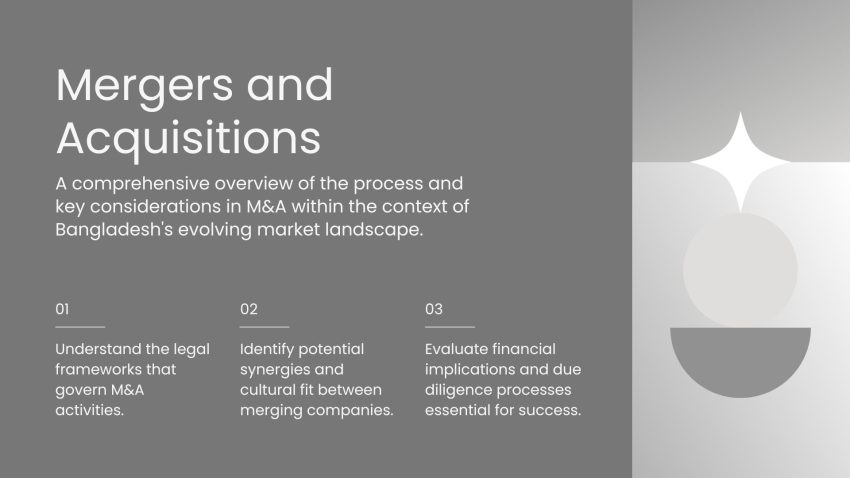Mergers and acquisitions (M&A) are complex corporate strategies that allow companies to consolidate assets, expand market presence, or achieve business synergies. In Bangladesh, these transactions are governed by a combination of corporate, tax, and regulatory laws. This blog outlines the key steps involved in executing an M&A transaction under Bangladeshi law.
Understand the Legal Framework
Before embarking on an M&A transaction in Bangladesh, it’s essential to grasp the relevant laws and regulations:
- The Companies Act, 1994: Governs corporate restructuring, mergers, and other corporate activities.
- The Income Tax Ordinance, 1984 & Income Tax Act, 2023: Addresses tax implications of mergers.
- The Bangladesh Securities and Exchange Commission (BSEC) Act, 1993: Applies to publicly traded companies.
- Competition Act, 2012: Ensures transactions do not create monopolistic practices.
Preliminary Steps
- Identify Objectives
Clearly define the purpose of the merger or acquisition. This could be market expansion, cost efficiency, or diversification. - Initial Discussions
Engage with potential partners or target companies to outline preliminary terms, confidentiality agreements, and intent.
Conduct Due Diligence
Thorough due diligence ensures that both parties understand the financial, legal, and operational aspects of the transaction. Key areas of focus include:
- Reviewing corporate governance documents.
- Auditing financial statements.
- Assessing compliance with tax laws and regulatory obligations.
- Identifying potential liabilities or risks.
Draft and Sign a Memorandum of Understanding (MoU)
A MoU outlines the initial terms and conditions of the transaction. While not legally binding, it establishes a framework for negotiations and mutual understanding.
Drafting the Scheme of Merger or Acquisition
- Draft a detailed Scheme of Merger or Arrangement that outlines the terms, valuation, and operational framework.
- Key elements of the Scheme include:
- Transfer of assets and liabilities.
- Shareholder rights and obligations.
- Employee retention plans.
Valuation and Pricing
Determine the fair value of the target company. This involves financial modeling, asset appraisal, and consideration of market conditions.
Structure the Transaction
Choose the appropriate transaction structure:
- Merger: Combines two entities into one.
- Acquisition: One entity acquires control of another.
The structure affects tax treatment, shareholder approval processes, and integration complexity.
Obtain Approvals
- Board Approval
Both companies must secure approval from their respective Boards of Directors for the transaction. - Shareholder Approval
In cases of mergers or significant acquisitions, shareholders’ consent is typically required through an Extraordinary General Meeting (EGM). - Regulatory Approval
Seek necessary approvals from the Registrar of Joint Stock Companies and Firms (RJSC), the BSEC (for listed companies), and the Bangladesh Competition Commission, where applicable.
Execute Definitive Agreements
Draft legally binding agreements, including the Share Purchase Agreement (SPA) or Merger Agreement. These documents detail terms such as purchase price, payment schedules, and representations.
Court Involvement and Approval
- Filing of the Application
- File a petition to the High Court Division of the Supreme Court of Bangladesh under Section 228 and Section 229 of the Companies Act, 1994.
- Submit the Scheme of Merger/Arrangement along with supporting documents, including:
- Board and shareholder resolutions.
- Audited financial statements.
- Valuation reports.
- A no-objection certificate (NOC) from the creditors, if applicable.
- Notice to Stakeholders
- Upon accepting the petition, the court issues directions to publish notices in newspapers to inform shareholders, creditors, and the public about the proposed merger.
- The notice invites objections, if any, to the Scheme.
- Court Hearings
- The court examines the Scheme in detail to ensure it is fair and reasonable.
- Stakeholders, including creditors and minority shareholders, may raise objections or provide feedback during the hearing.
- Approval Order
- If satisfied, the court sanctions the Scheme by passing an Order of Approval.
- The Order may include specific conditions to safeguard the interests of stakeholders.
Compliance and Filings
- File the court-sanctioned Scheme with the RJSC within the prescribed timeline.
- Update the company’s memorandum and articles of association to reflect the changes.
- Obtain a Certificate of Registration from the RJSC, which finalizes the merger.
Integration and Post-Merger Activities
Asset and Liability Transfer
- Transfer all assets, liabilities, and business operations as per the terms of the Scheme.
- Update ownership and registration of immovable properties, trademarks, and intellectual property.
Tax and Regulatory Compliance
- Settle tax obligations arising from the merger or acquisition, including capital gains tax.
- Notify regulatory bodies, such as the Bangladesh Bank or BSEC, depending on the nature of the transaction.
Stakeholder Communication
- Inform employees, customers, and vendors about the merger or acquisition.
- Provide transparent updates to shareholders on integration progress and expected benefits.
Key Considerations for Court-Driven M&A in Bangladesh
- Fair Valuation: The court ensures the valuation is fair and equitable for all stakeholders, especially minority shareholders.
- Protection of Minority Rights: The court examines whether the Scheme disproportionately impacts minority shareholders.
- Creditor Safeguards: The court requires creditors to be paid or secured before approving the Scheme.
- Compliance with Laws: The court verifies compliance with corporate, tax, and regulatory requirements.
Conclusion
Mergers and acquisitions in Bangladesh involve a robust legal framework and rigorous court procedures to ensure fairness and compliance. By following the detailed steps outlined above, companies can successfully execute M&A transactions and unlock significant value. This comprehensive guide to M&A under Bangladeshi law emphasizes the need for meticulous planning and adherence to legal protocols, ensuring smooth transitions and sustainable growth. However, due to the complexity of the process, it is advisable to engage experienced legal, financial, and tax advisors for seamless execution.
© Bibhuti B Sarker, Advocate, Supreme Court of Bangladesh.

